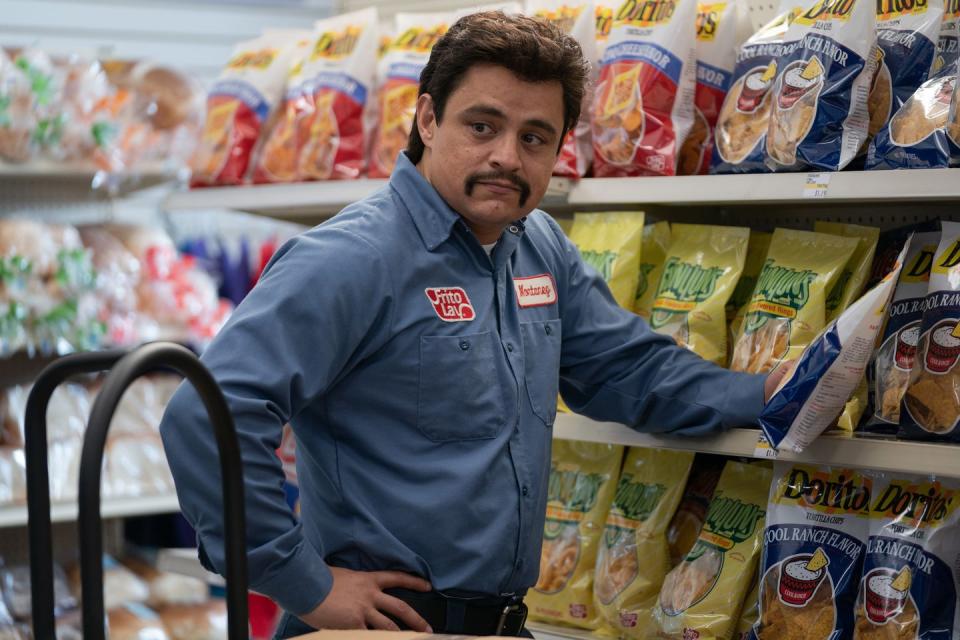How Martin Scorsese and Steven Spielberg helped shape Eva Longoria's directorial debut
Every product, it seems, from trainers to videogames, now comes with its own cinematic origin story. But there are very few like Flamin’ Hot – an adaptation of Richard Montañez's memoir A Boy, a Burrito, and a Cookie, which lays out how the one-time Frito-Lay janitor came up with the Flamin' Hot Cheeto and subsequently climbed the company's ranks to become its vice president of multicultural sales.
For director Eva Longoria, who seized the opportunity to make Richard's story her narrative debut, there was an empowering directive encased within all that powdered flavouring and corn crunch. Richard's story is one about subverting expectations.
It's about what it's like to be faced with closed door after closed door, and choosing instead to blow a hole in the wall and make it through anyway. "I've been told no," she says. "I've been told 'ideas don't come from people like you'. 'You're a woman, maybe you shouldn't direct.' And we just dared to ask, but why not? Why not me?"
To those in the UK, the lowly Cheeto may not seem like all that much. But as the former Desperate Housewives star explains: "It's the number one snack in the world – in the world – and it's a multibillion-dollar product that has gone past snacks. There's a makeup line, there's Mountain Dew, there's sushi, there's ice cream, there's mac and cheese. This Flamin' Hot brand has taken over." Even for the Cheeto-adverse, the Flamin' Hot variety is still responsible for "launching the entire spicy industry back in the '80s and '90s."
Montañez's idea was relatively simple, but no one had bothered all that much before to think about how cultural specificity shaped people's snacking habits. "Latinos like spice," Longoria explains. "But Mexicans, specifically – we put hot sauce on everything. We would buy chips and Cheetos and popcorn and we'd put hot sauce on it. His idea was revolutionary because he said 'it’s for the Hispanic market'.
"He's, like, why don't you market it differently and do different products for different sectors of the market? And, before Richard, no major Fortune 500 company really did that. There was no multicultural marketing person. So he's really known as the godfather of Latino marketing."
Although an LA Times report has contested Montañez’s claim – with a quote from Frito-Lay revealing that he "was not involved in any capacity in the test market" – the company swiftly doubled back by telling NPR that he was, undoubtedly, "a part of" the overall creation process.
But the controversy, perhaps, obscures what Flamin' Hot is really about and why the film has found such success outside of the US. It's less to do with the nuts and bolts of a snack food's creation, and more to do with the obstacles that must be overcome simply to be heard. "What he went through is universal," Longoria says. "And so a lot of people are relating to his journey."

It was a notion of universality, too, that guided Longoria’s hand through what Jesse Garcia, who plays Richard, describes as "a very long and fast and furious shoot". The director enthusiastically pulled from and remixed the language of some of cinema's giants: "Ron Howard, Steven Spielberg, [Martin] Scorsese, Adam McKay. All for different reasons.
"A rundown of the internal hierarchy of the Frito-Lay cafeteria became 'my Casino scene'. The camera's movement across the factory floor was inspired by Steven Spielberg's work, particularly The Post.
"The way Spielberg hides coverage in a oner was something I was committed to doing," Longoria adds. "Spielberg does that a lot. It's just sweeping, but then it turns into a close-up and you're, like, how did he do that?"
Another sequence sees Richard offer his own style of narration over a boardroom meeting. "Linda [Yvette Chávez, one of the film’s screenwriters], and I were like, wouldn't it be funny if they spoke like him in the boardroom?" Longoria says. "Because why wouldn't they, right? So those scenes were really based on this show called Drunk History. I love Drunk History!"
Other key parts of the narration borrowed from the "journalistic approach" of Adam McKay's The Big Short or Vice. "I felt like people don't understand the Chicano movement in the United States and how we also are discriminated against," she says.
"I need to tell people, look, this is what a Chicano is. Our rights were being taken away. We were being shipped off to war, we've been [targets of] police brutality. And so I love how in [McKay's] movies, he really sets the table. He says it super fast. So it's not a history lesson, but it is setting the table for the era. And people go, 'oh, I got it.'"
Flamin' Hot is released on Disney+ in the UK and on Hulu in the US on June 9.
You Might Also Like

 Yahoo Sport
Yahoo Sport 





































